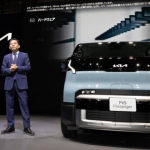A decade after the original Dieselgate scandal shook the global automotive industry, the controversy has resurfaced in dramatic fashion—this time in the United Kingdom. In October 2025, London’s High Court became the stage for one of the largest mass lawsuits in English legal history, as 1.6 million claimants took on some of the world’s biggest carmakers over allegations of emissions cheating. The trial has reignited public scrutiny over diesel technology and corporate accountability, and its outcome could reshape the future of automotive regulation in Europe.
🔍 The Origins of Dieselgate
The Dieselgate scandal first erupted in 2015 when Volkswagen admitted to installing “defeat devices” in millions of diesel vehicles worldwide. These devices were designed to detect when a car was undergoing emissions testing and temporarily reduce nitrogen oxide output to meet legal limits. However, during regular driving conditions, the vehicles emitted pollutants far above the permissible levels. The fallout was swift and severe—Volkswagen faced billions in fines, recalls, and a massive reputational hit.

⚖️ The UK Trial: Who’s Involved?
Fast forward to 2025, and the scandal has expanded beyond Volkswagen. The London High Court trial involves five major carmakers: Mercedes-Benz, Ford, Renault, Nissan, and Stellantis (which owns Peugeot and Citroën). These companies are accused of using similar defeat devices in their diesel vehicles sold in the UK. The claimants allege that they were misled into purchasing cars marketed as environmentally friendly, only to discover that the vehicles were polluting far more than advertised.
The case is being led by prominent law firms such as Leigh Day, which argue that the manufacturers knowingly manipulated emissions data. If successful, the lawsuit could result in billions of pounds in compensation and set a precedent for future environmental litigation.
🧪 What Are Defeat Devices?
At the heart of the trial are the so-called “defeat devices.” These are software systems embedded in a vehicle’s engine control unit that can detect when the car is undergoing official emissions testing. During the test, the device alters engine performance to reduce emissions. Once the test is over, the system reverts to normal operation, allowing the vehicle to emit higher levels of pollutants.
Manufacturers argue that their emissions control systems are legally and technically justified. Mercedes-Benz, for instance, has stated that its technology complies with all relevant regulations and that the claims against it are fundamentally flawed.
📉 Impact on Consumers and the Industry
For consumers, the implications are significant. Many diesel vehicle owners feel betrayed, having invested in cars they believed were both efficient and environmentally responsible. The lawsuit seeks to compensate these individuals for the financial and environmental deception they experienced.
For the industry, the trial is a wake-up call. It underscores the need for greater transparency and accountability in emissions reporting. It also raises questions about the future of diesel technology, which has already been under pressure from tightening regulations and the rise of electric vehicles.
🌍 Environmental and Legal Ramifications
The environmental stakes are high. Nitrogen oxide emissions contribute to air pollution, respiratory illnesses, and climate change. The widespread use of defeat devices undermines efforts to reduce these harmful pollutants and casts doubt on the effectiveness of current regulatory frameworks.
Legally, the trial could redefine how emissions standards are enforced. If the court rules in favor of the claimants, it may lead to stricter oversight of vehicle testing procedures and harsher penalties for non-compliance. It could also encourage similar lawsuits in other jurisdictions, amplifying the global impact of the case.

🔮 What’s Next?
The trial is expected to last three months, with extensive technical evidence and expert testimony. The outcome will hinge on whether the court finds that the defeat devices were intentionally used to circumvent emissions laws. If so, the manufacturers could face not only financial penalties but also long-term damage to their reputations.
Regardless of the verdict, the Dieselgate saga serves as a cautionary tale. It highlights the tension between technological innovation and ethical responsibility, and it reminds us that environmental integrity must be a cornerstone of industrial progress.
📝 Final Thoughts
The London High Court trial is more than just a legal battle—it’s a moment of reckoning for the automotive industry. As consumers, regulators, and manufacturers grapple with the consequences of Dieselgate, the case may well become a defining chapter in the story of sustainable transportation.
Whether justice will be served remains to be seen, but one thing is clear: the road to cleaner, more honest mobility must be paved with transparency, accountability, and a commitment to the truth.

Hello, my name is Muskan Kumari and I am an experienced Digital Marketer. I have been blogging for the last 3 years and I have special interest in SEO. Here I give you easy bikes and writes easy-to-understand reviews and news about the latest bikes, helping readers choose the best options.. My aim is to always provide you with accurate, new and useful information.










